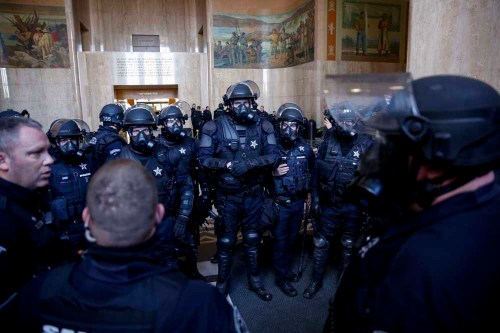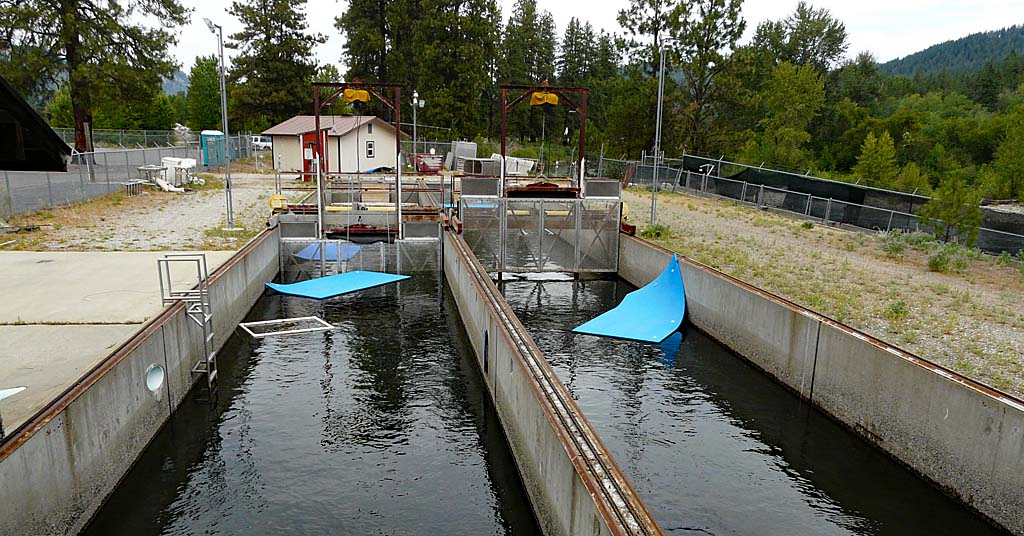Local legislators reflect on special session
Published 7:00 am Tuesday, December 29, 2020

- Police gather inside the rotunda of the Oregon state Capitol as they prepare for protests during a special session of the state Legislature in Salem on Monday, Dec. 21, 2020. State police declared an unlawful assembly at Oregon’s Capitol building as protesters opposed to COVID-19 restrictions attempted to force their way in during the third special legislative session.
SALEM — The Oregon Legislature’s third and final special session of the year was “definitely memorable,” said Rep. Greg Smith, R-Heppner.
As the Legislature met inside the Oregon Capitol on Monday, Dec. 21, with masks and social distancing, protesters attempted to force their way into the building after being denied access due to COVID-19 restrictions. Oregon State Police declared the protest, organized by the right-wing group Patriot Prayer, an unlawful gathering and arrested four protesters for trespassing and disorderly conduct.
Trending
Smith said there is “no place” for violence or destruction of public property, and he categorized the amount of taxpayer dollars used in the police response as “unfortunate.”
He also said, however, that he felt with the technology and infrastructure available to the state there should be more public access to the Legislature during sessions conducted during the pandemic.
“I’m of the opinion this whole process could have been avoided,” he said.
The Capitol building is not the Legislature, Smith said, and the Legislature is not required to meet there. He said he would have liked to see the Legislature make use of the spacious field houses of area colleges, with each chamber meeting in a separate athletic facility where observers could be safely accommodated with plenty of social distancing and ventilation. At minimum, he said, he would like to see people be allowed to make an appointment via Zoom to testify before committees.
“When you go down a path that shuts out the public, that creates anxiety,” he said.
As for the work accomplished by the Legislature during their one-day session, Smith said he was pleased to be able to vote to provide liability relief to schools as they navigate trying to open classrooms safely during the pandemic. However, he didn’t think the bill went far enough, and wished it had also extended protections to other categories, such as the hospitality industry and medical clinics.
Trending
He said said the $600 million the Legislature set aside for additional COVID relief efforts seemed “reasonable,” and said he was glad to see additional financial relief for tenants and landlords pass, but he did question the constitutionality of the eviction moratorium that has been in place since the spring.
“The Legislature has broad abilities, but the ability to break a contract is not one of them,” he said.
Rep. Greg Barreto, R-Cove, could not attend the special session because he is self-quarantining after possible exposure to someone with COVID-19. As of Tuesday, Dec. 22, Barreto was in the 10th day of a 14-day quarantine and has had no symptoms of the virus.
The state representative said he would have voted for three of the four bills the Legislature ultimately passed.
The bill Barreto would have voted against is House Bill 4401, which extends a statewide moratorium on evictions until July 1, 2020. The eviction ban, which has been in place for at least several months, had been scheduled to lapse on Jan. 1, 2021. Barreto opposed HB 4401 because he said too many tenants are taking advantage of the statewide moratorium on evictions.
Barreto said he would have supported House Bill 4402, which protects schools from COVID-19 lawsuits. HB 4402 would prevent a school from being liable if someone contracts COVID-19 through it.
The state representative said HB 4402 is a good bill. However, he does have one reservation, explaining it is unfortunate that while the government is protecting schools, it is not protecting businesses in this way.
Barreto also said he would have also supported the legislation passed that provides more state funding for wildfire recovery, and Senate Bill 1801, which allows restaurants to sell to-go cocktails. Barreto said he supports the sale of takeout cocktails because it will help restaurants. Barreto said he was opposed to earlier to-go cocktail legislation because it would have required restaurants to pay fees that would have made it cost prohibitive for restaurants to offer this service.
“The cost of making a cocktail would have been more than the sale,” Barreto said.
Barreto said he doubts that the to-go cocktail legislation will provide a major financial boost to restaurants.
Sen. Bill Hansell, R-Athena, was also excused from the special session while on a family vacation. He said he followed the session and the bills involved, however.
“The one that was particularly important, I thought, was the school liability one,” he said.
Hansell said the $200 million in relief for landlords and tenants is better than doing nothing, but said he is hearing it would take $500 million to make landlords “whole” for the rent they have not received this year due to the eviction moratorium. He said he would like to see additional relief for landlords, either through legislation the next session or as part of the overall $600 million COVID relief funds.
“I’m hoping that discussion is not over yet,” he said.
———
La Grande Observer reporter Dick Mason contributed to this report.









